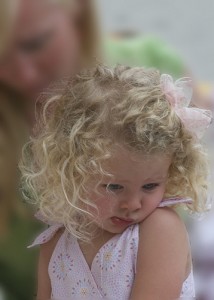Children Who Are Shy, Part Two
 Last week, I wrote a post in response to a reader’s concern about her shy daughter’s difficulty in making friends. In my preparation, I was amazed by how much I still have to learn about various personality types and how we can almost “typecast” our kids with certain traits. I think there is a danger in putting our children in some kind of personality box and expecting them to remain that way for most of their lives. I doubt we want to label our kids. But I can see myself veering into that territory already. “Lucy is such a smart, stubborn little girl.” “Eli likes to be by himself in larger groups.” If I’m not careful, I will start believing my kids will always be this way, and then I might react unpleasantly if they don’t. And this would make them feel badly about themselves.
Last week, I wrote a post in response to a reader’s concern about her shy daughter’s difficulty in making friends. In my preparation, I was amazed by how much I still have to learn about various personality types and how we can almost “typecast” our kids with certain traits. I think there is a danger in putting our children in some kind of personality box and expecting them to remain that way for most of their lives. I doubt we want to label our kids. But I can see myself veering into that territory already. “Lucy is such a smart, stubborn little girl.” “Eli likes to be by himself in larger groups.” If I’m not careful, I will start believing my kids will always be this way, and then I might react unpleasantly if they don’t. And this would make them feel badly about themselves.
Has anyone ever labeled you? Are you considered melodramatic, intellectual, athletic, artistic, left-brained, right-brained, nosy, outspoken, introverted, a people-person, etc? How do those labels make you feel? Have you ever tried to make changes in yourself only to find that people can’t handle a different behavior coming from you? (Side note: Do you like those personality quizzes – like Myers-Briggs - that explain all of your behaviors away in a startlingly accurate paragraph? My husband hates them. He chafes at being put in a box. I’ve always said he has a personality that defies most standard definitions. ![]() ) But I digress.
) But I digress.
I came across several helpful websites when researching last week about shyness. I will list those at the end of the post if you are interested in learning more. But the thing that stood out to me the most in my reading was from Dr. Renee Gilbert’s site, Shake Your Shyness. In it, she categorized shyness not as a personality trait but a feeling that can come and go, depending on the circumstances. Dr. Gilbert states:
“You see, shyness viewed as a “feeling” is difficult, but manageable, whereas shyness viewed as an “enduring personality trait” can be overwhelming. Had I, as a shy child, believed that I had a shy “personality,” I might easily have gotten discouraged and given up. But because I viewed my shyness as a feeling, as something I could do something about, I always felt there was hope. I knew that if I could just figure out what to do to fit in and muster the courage to do it, everything would be OK–and it was.”
This spoke to me on many levels. I was struck by the freedom that comes from thinking a child’s personality characteristics might actually be circumstantial, not permanent. How many times have you been in situations where you felt shy, even though you can be equally talkative and confident in others? It depends on the situation – who we’re with, what’s expected of us, and how the environment makes us feel. The same can be true of our children.
It struck me that it is not good to label our children with an “enduring personality trait” – instead, we must celebrate their strengths on a routine basis and help build their confidence in as many things as we possibly can.
Here are some interesting sites I discovered regarding shyness:
- Shake Your Shyness (my favorite)
- Helping Young Children Overcome Shyness from the University of New England
- Center for Effective Parenting’s page on shyness
- The Shy Child by Hyson & Trieste
What do you think, moms? Is it easy to put our kids’ personalities in a box? Do you have any strategies for raising well-rounded children, capable of many different skills and exhibiting many unique moods?
photo courtesy of allspice1
Share the fun: Email + Del.icio.us + Digg + Technorati




Yes, I’ve goofed.
My 6 year old is typically out-spoken, friendly, wanting to be the center of attention.
The few times when he’s acted shy, I acted like that was silly and dismissed it, then helped him join the group.
I’ve since seen my error and found I need to acknowledge every feeling, giving validation, and then helping with the situation.
It was just so strange to see my clown act so shy!